[ad_1]
While couture has long been associated with names such as Coco Chanel, Yves Saint Laurent and John Galliano, fresh Asian faces are breaking new ground in the world of haute couture, changing the narrative in an industry dominated by the giants of luxury of the western hemisphere.
Meet Celine Kwan, Yueqi Qi, Tomo Koizumi, Sohee Park, Ryunosuke Okazaki and Sensen Lii – six East Asian fashion designers making their mark. As part of K11 Musea and the Victoria and Albert Museum’s (V&A) joint exhibition The Love Of Couture: Artisanship In Fashion Beyond Time, these rising stars designed bespoke couture pieces inspired by a collection of British and French womenswear from the 1830s around 1960, specially curated by the V&A.
Conceived by renowned Hong Kong production designer William Chang Suk Ping, Love of Couture spotlights the original works of these six Asian designers alongside a chronological display of fashion selections from the V&A archive. Charting the evolution of fashion across time and culture, the exhibition invites guests to appreciate the historic craft of French origin through a contemporary Asian lens.
Celine Kwan
Celine Kwan poses in her new dress designed for the exhibition “The Love of Couture: Artisanship In Fashion Beyond Time”.
Photo: K11 Museum
Celine Kwan poses in her new dress designed for the exhibition “The Love of Couture: Artisanship In Fashion Beyond Time”.
Photo: K11 Museum
Bringing her own distinct vibrancy to the space is Hong Kong’s own Celine Kwan. Inspired by a yellow evening dress from post-war London, her dress features a whimsical lime and pink print and puffy skirt.
The young designer creates her gorgeous masterpieces with two goals in mind. One, to turn heads and two, to make someone smile. “I’m a very happy person, so I really like to make people smile, especially with my clothes,” she laughs. “Fashion is very serious these days!”
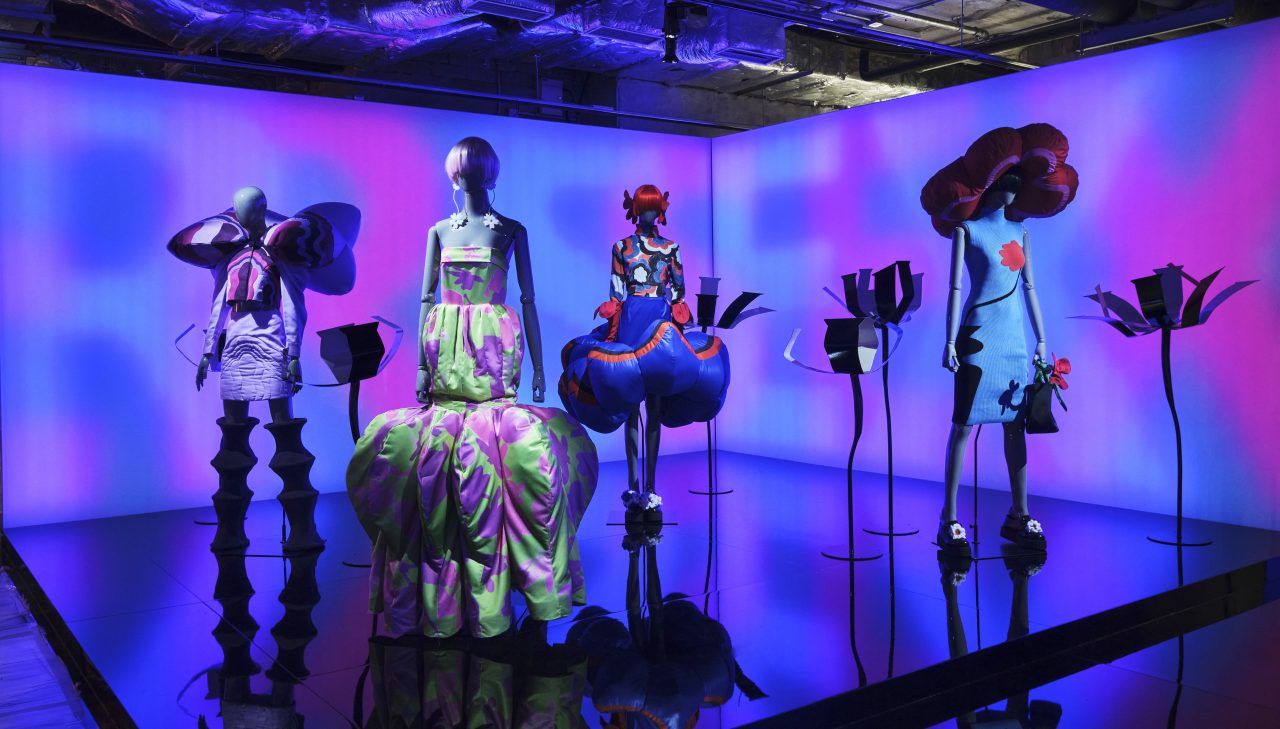
Works by Celine Kwan in the exhibition “The Love of Couture: Artisanship In Fashion Beyond Time”
Photo: K11 Museum
Works by Celine Kwan in the exhibition “The Love of Couture: Artisanship In Fashion Beyond Time”
Photo: K11 Museum
Kwan is no stranger to standing out from the crowd. Born in Hong Kong, she left for the UK when she was twelve and was the only Asian student at her school. “It really taught me to break barriers and be brave because I had to take care of myself,” she recalls. The tenacity she has as a designer, or her “oomph” as Celine says, comes from her lived experiences as an Asian in the UK. “Oh, and I learned not to give a damn about stereotypes,” she added with a smile.
“Since the bar is not set for Asian high fashion designers, there is so much potential and freedom for us to interpret the craft and bring our visions to life. We get to define or create our own definition of what fashion can be as Asian designers, which is really exciting.”
Yueqi Qi
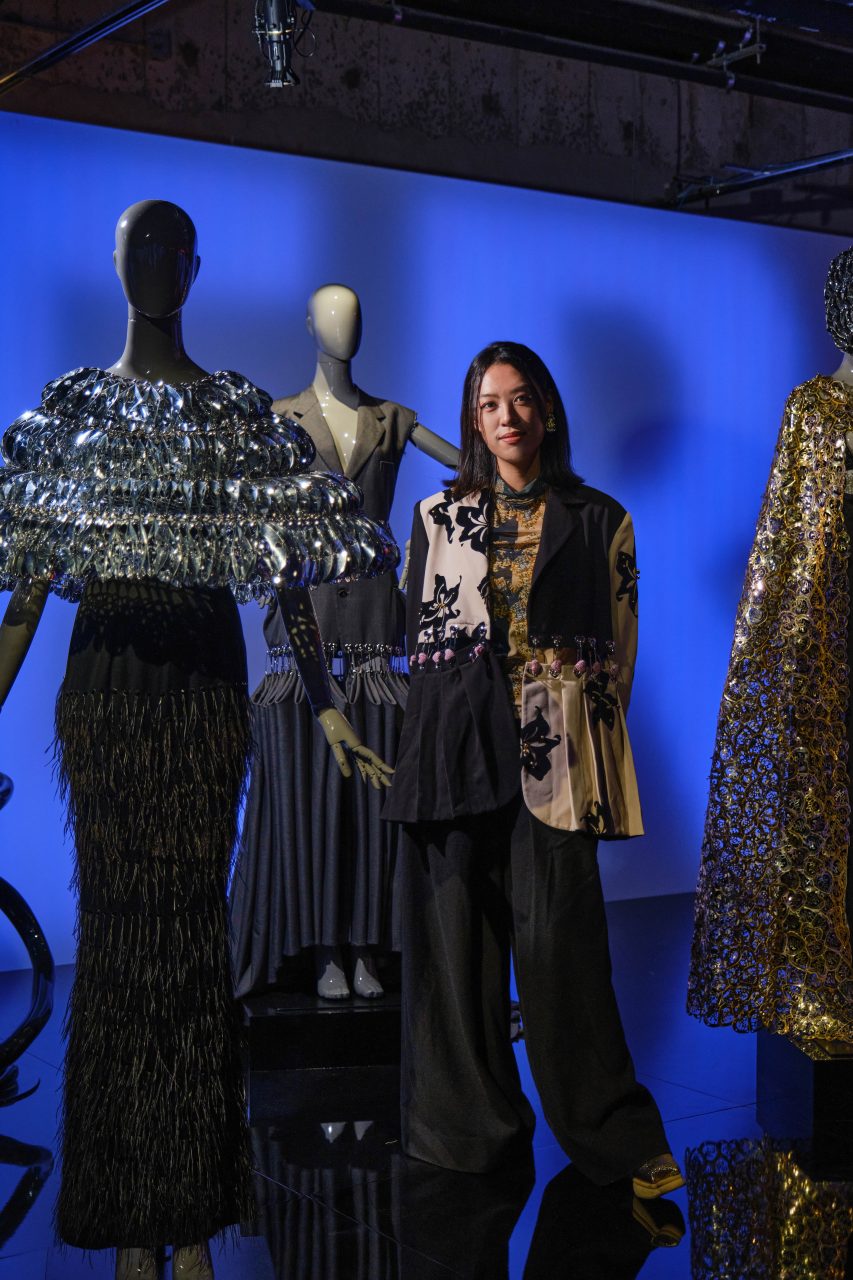
Yueqi Qi poses with her new designs at the exhibition “The Love of Couture: Artisanship In Fashion Beyond Time”
Photo: K11 Museum
Yueqi Qi poses with her new designs at the exhibition “The Love of Couture: Artisanship In Fashion Beyond Time”
Photo: K11 Museum
Love lies at the heart of Yueqi Qi’s creations. The Guangzhou-based designer centered her four-piece mini collection for the show around a single motif: 「爱」, the Chinese character for love. Laser-cut metal 「爱」 characters are chained together to form capes and dresses that straddle the line between utilitarian and avant-garde. However, behind her tense, armor-like parts lies a story that will melt any heart.
“I created my brand when the pandemic started. All the factories were closed and I could not make my beaded clothes. I was buying breakfast one day when I panicked loudly at an auntie working at the stall. ‘What should I do?’ I said, ‘There is nobody who can help me with the production.’ And she asked me, “What if you let me try?”
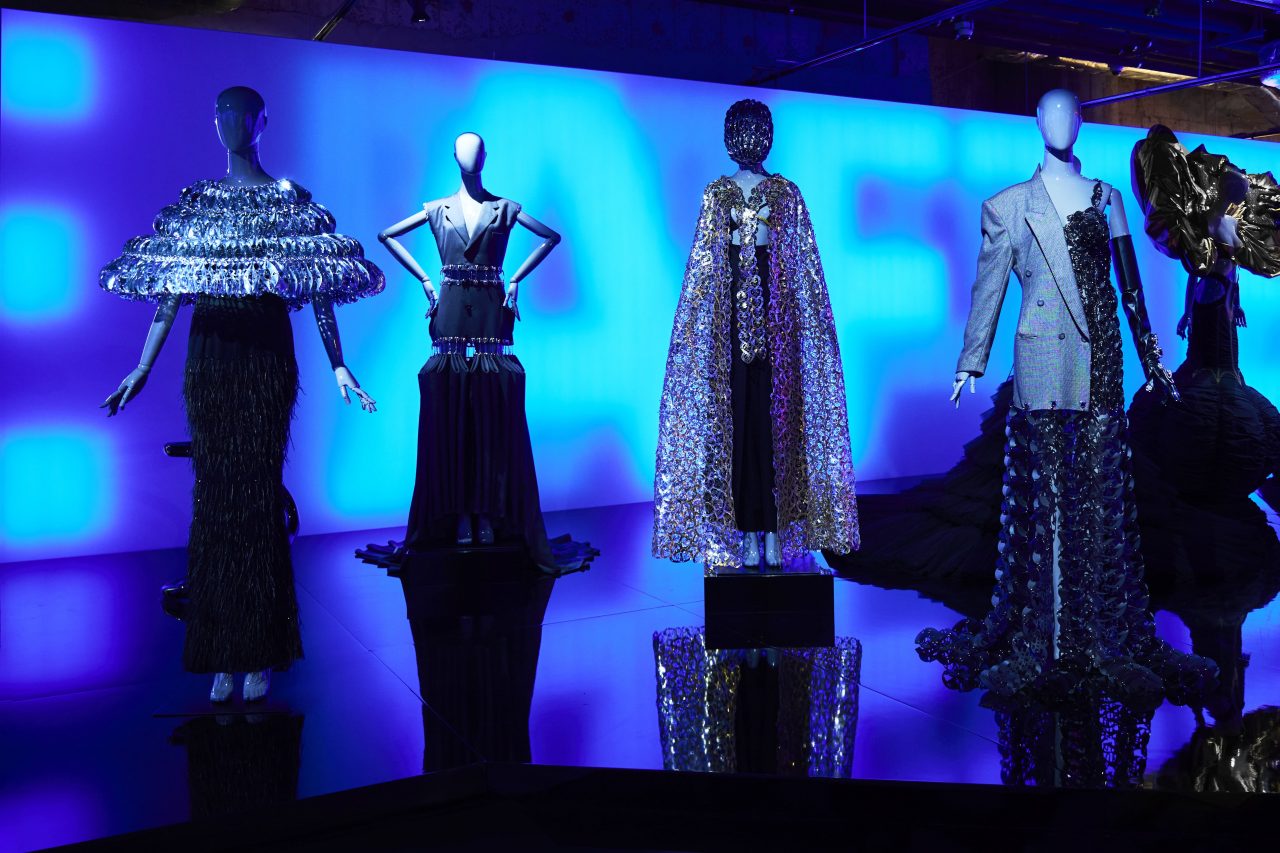
Works by Yueqi Qi in the exhibition “The Love of Couture: Artisanship In Fashion Beyond Time”
Photo: K11 Museum
Works by Yueqi Qi in the exhibition “The Love of Couture: Artisanship In Fashion Beyond Time”
Photo: K11 Museum
Today, Yueqi Qi’s eponymous brand is supported by an undefeated team of over 300 women, from breakfast stall workers to housewives to women with disabilities aiming for the craft. “I’ve always been in the mood for love and now I can return that love. Through my bead supply chain, I hope to empower more housewives and women with disabilities with the opportunity to work from home. This is love, – she beamed with a radiant smile, “great love.”
For Qi, fashion is a manifestation of a different kind of love: a designer’s love for her craft. “Couture embodies the soul of a designer. Ready-to-wear is often commercialized, but a designer speaks to their heart and soul through fashion,” she explained. “As long as you believe in yourself and stay true to what you stand for, your story will shine through your art and be special.”
Tomo Koizumi
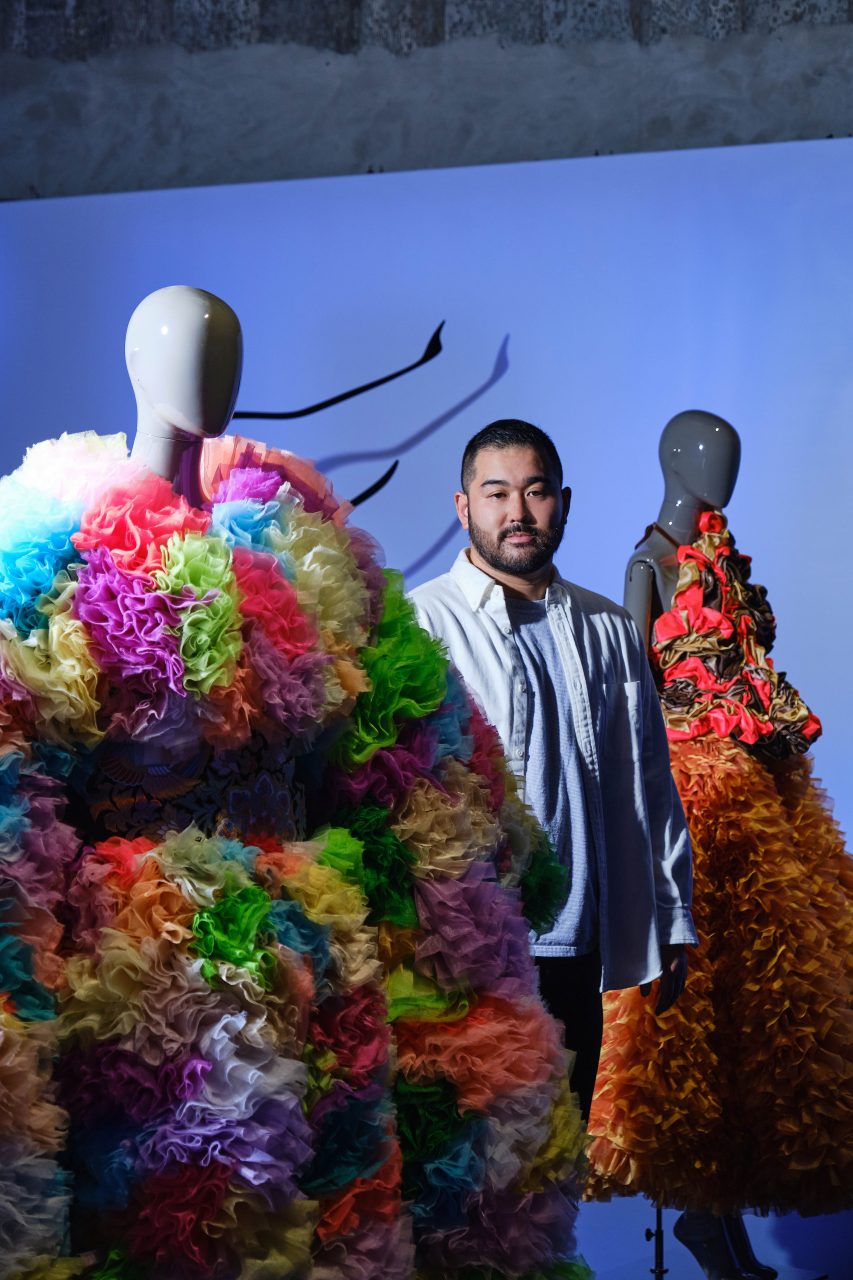
Tomo Koizumi poses with his designs at the exhibition “The Love of Couture: Artisanship In Fashion Beyond Time”
Photo: K11 Museum
Tomo Koizumi poses with his designs at the exhibition “The Love of Couture: Artisanship In Fashion Beyond Time”
Photo: K11 Museum
“Everyone can put ruffles on clothes, but not many people can make clothes out of grapes,” said Tomo Koizumi. And he belongs to the latter. The name of the Japanese designer has become synonymous with ruffles. Big and small, painted in every color you can think of.
But why the mess? “So I grew up in this crazy, colorful garden…” he began to explain.
The crazy colorful garden in question? The flowers and ribbons on the funeral banners were prepared by his mother while working at his uncle’s funeral company. Having grown up surrounded by “big plastic flowers that came in metallics and pastels,” Koizumi unconsciously transformed moments from his childhood into his signature dresses, something he only realized in hindsight. “It shows how deeply embedded it is in my identity,” he said.
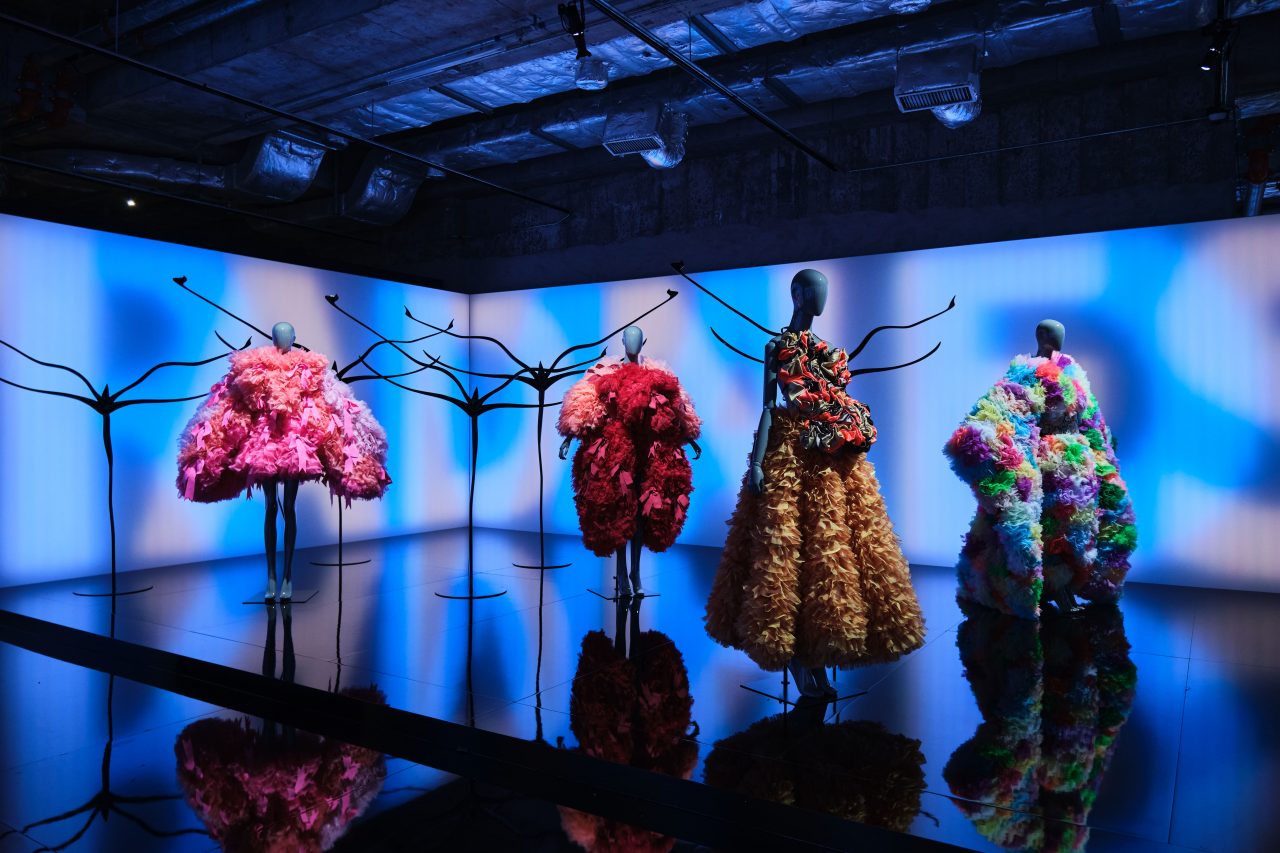
Works by Tomo Koizumi in the exhibition “Love of Fashion: Craftsmanship in Fashion Beyond Time”
Photo: K11 Museum
Works by Tomo Koizumi in the exhibition “Love of Fashion: Craftsmanship in Fashion Beyond Time”
Photo: K11 Museum
His work commissioned for the exhibition includes a waistcoat jacket and an A-line skirt handmade from lightning bolts in orange, beige and brown, a relatively muted palette that gives it the color of a wedding dress from 1830s England.
“The top is made by hand stitching and a smoking technique. I don’t usually use hand stitching that much, but this time I wanted to highlight the handwork and dedication that goes into fashion.” He paused and laughed as he made a small confession. “I didn’t actually do extensive research on the V&A dress I chose to reference. It just looked so cute and I loved it!”
Cute is certainly one way to describe the Tomo Koizumi brand. Influenced by Japanese pop culture, there’s a light and bubbly sensibility to Tomo’s designs. “I grew up watching anime like Sailor Moon,” he said, “Actually, the ideal woman Tomo Koizumi is like Sailor Moon! She may look cute in my dresses, but she’s really strong.”
Ryunosuke Okazaki
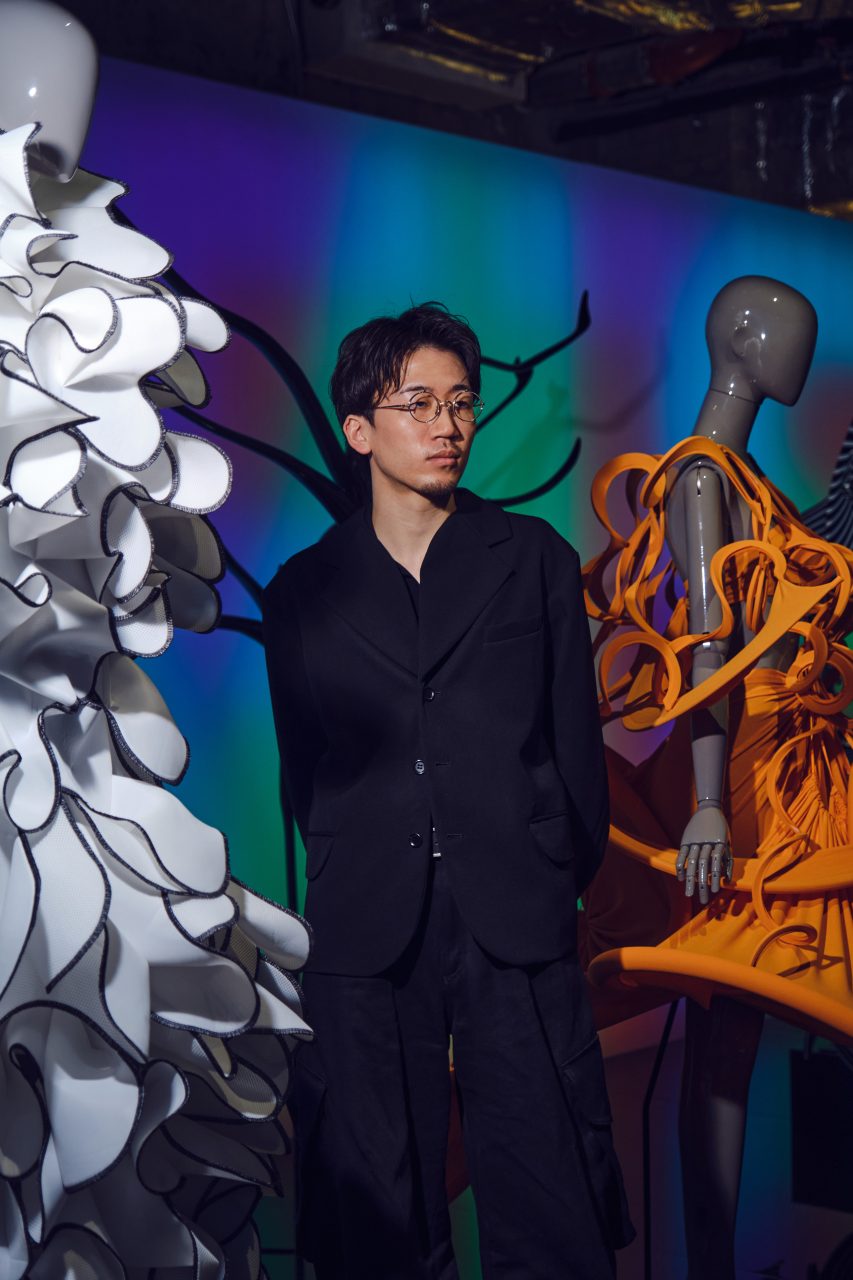
Ryunosuke Okazaki poses with his designs at the exhibition “The Love of Couture: Artisanship In Fashion Beyond Time”
Photo: K11 Museum
Ryunosuke Okazaki poses with his designs at the exhibition “The Love of Couture: Artisanship In Fashion Beyond Time”
Photo: K11 Museum
Also hailing from Japan is Ryunosuke Okazaki, who has never drawn a sketch in his entire fashion career. It may be hard to believe for anyone who has even glimpsed his avant-garde creations, but it’s natural for the designer to work his magic without a plan.
“The elasticity, flexibility and weight of my materials define the way I work,” he explained. “I create everything using my hands. By interacting and forming a dialogue with the materials I am working with, unexpected forms can be created.”
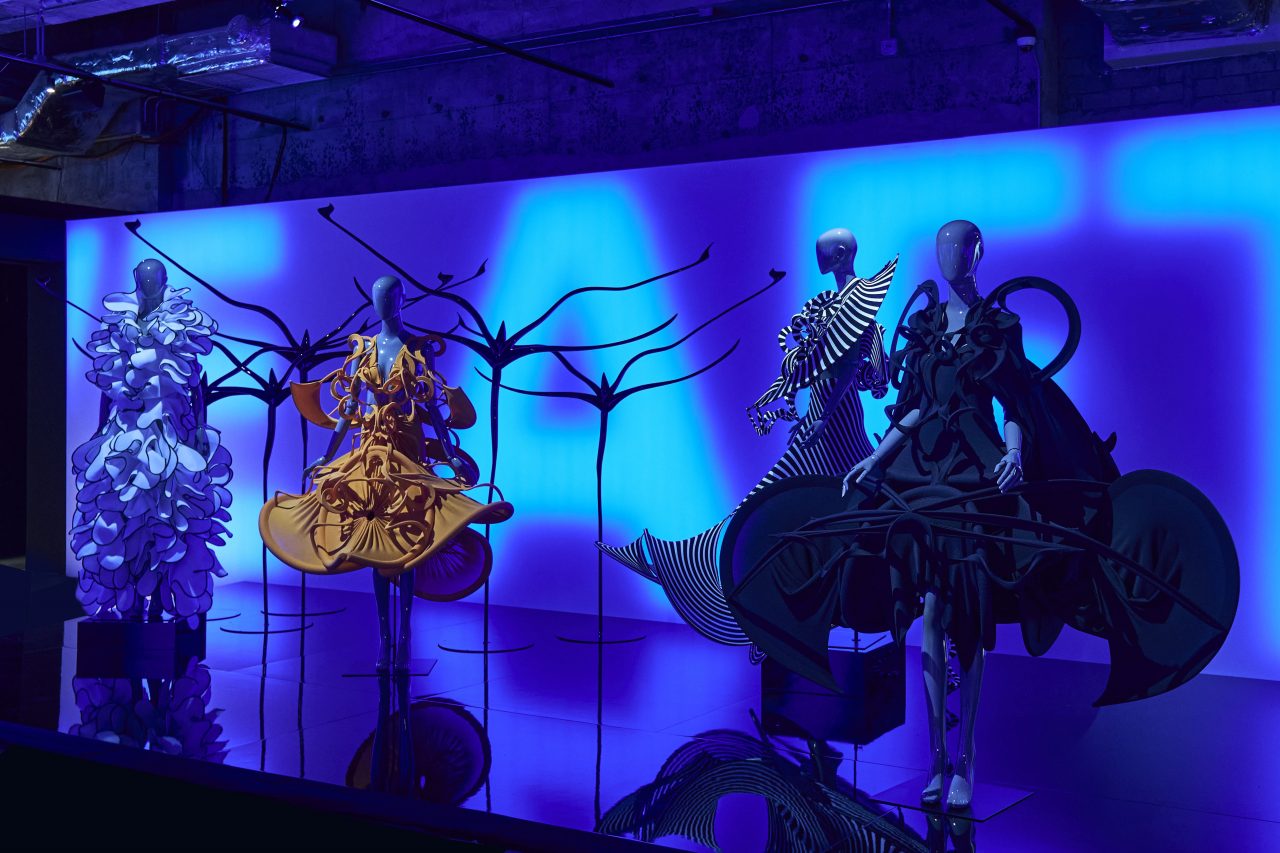
Works by Ryunosuke Okazaki in the exhibition “The Love of Couture: Artisanship In Fashion Beyond Time”
Photo: K11 Museum
Works by Ryunosuke Okazaki in the exhibition “The Love of Couture: Artisanship In Fashion Beyond Time”
Photo: K11 Museum
His clothes are really unexpected. Okazaki’s newest creation transforms the 2D embroidery on Paul Poiret’s 1920s Samovar evening dress into 3D. It brings golden threads to life through fascinating sculptural curves that seem otherworldly, but also somewhat reminiscent of the geometric shapes you might find in nature.
Born and raised in Hiroshima, where the atomic bomb was dropped in 1945, the designer is fascinated by the relationship between people, prayer and nature. “I’m inspired by prayer, by Shinto and Jomon ceramics,” he said. “The Japanese Shinto religion makes us aware of the harmony between humanity and nature, and you could say it is a prayer for life. The spirit of survival, which lies at the heart of this prayer, is shared by generations of Japanese people.”
A “prayer” is how he describes his design process. “When people wear my clothes, I would like to think that they are wearing a piece of nature,” he continued, “and harmony is formed.”
Sohee Park
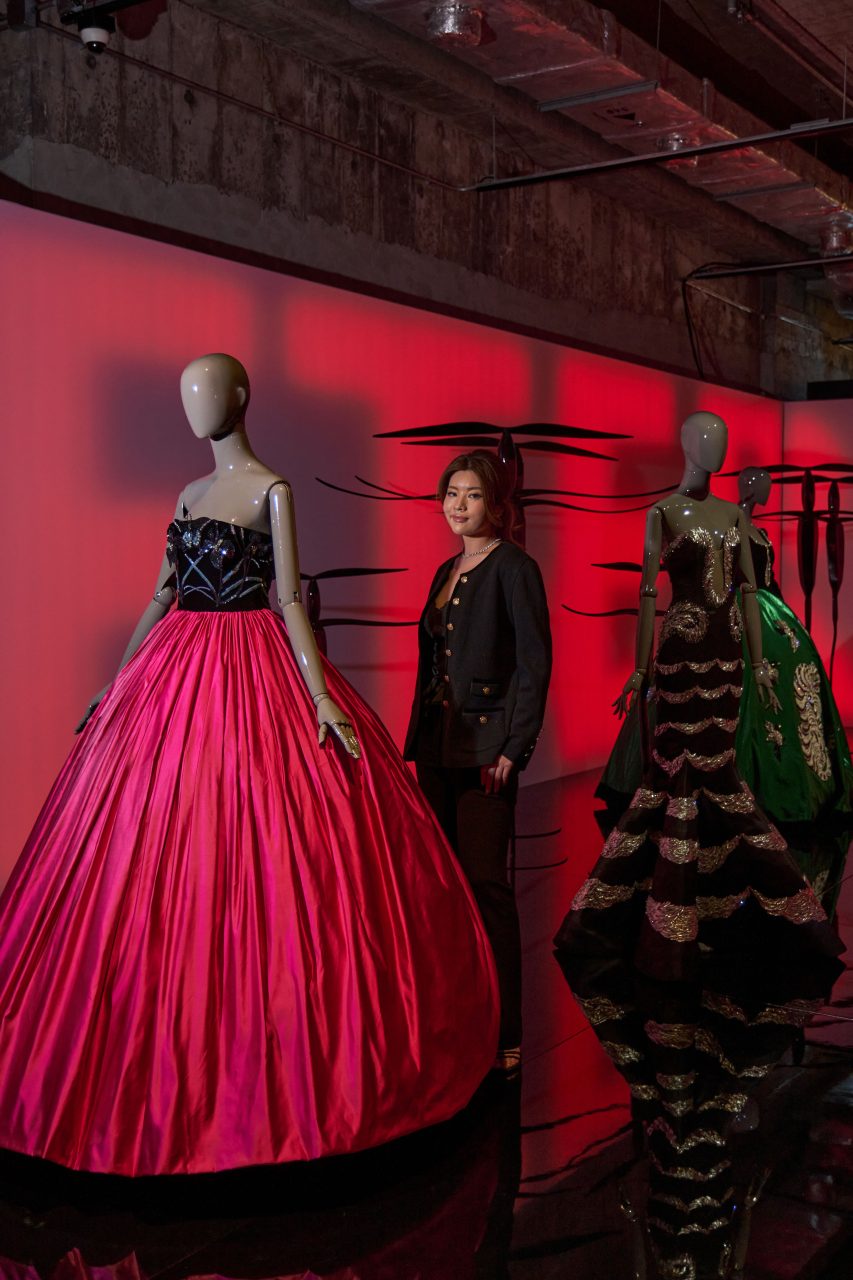
Sohee Park poses in her new dress designed for the exhibition “The Love of Couture: Artisanship In Fashion Beyond Time”
Photo: K11 Museum
Sohee Park poses in her new dress designed for the exhibition “The Love of Couture: Artisanship In Fashion Beyond Time”
Photo: K11 Museum
Fresh from her Milan Fashion Week debut with Dolce and Gabbana is Sohee Park, founder of Miss Sohee. Based in London, the South Korean couturier was invited to create the V&A Museum’s Christmas tree this year, which she reimagined as a 3.5m veiled statue wearing a white silk chiffon cape embroidered with sparkling stars .
Voluminous silhouettes and intricate embroideries are quintessentially Miss Sohee, and her new dress for the show, inspired by Yves Saint Laurent’s Polynésie evening gown, is no exception.
“I need a large canvas to embroider, so I really go for voluminous shapes and bring my sketches to life,” Park said with a twinkle of passion in her eyes. “I see myself continuing to do that. I don’t know how long, but a long time.”
Sensen Lee
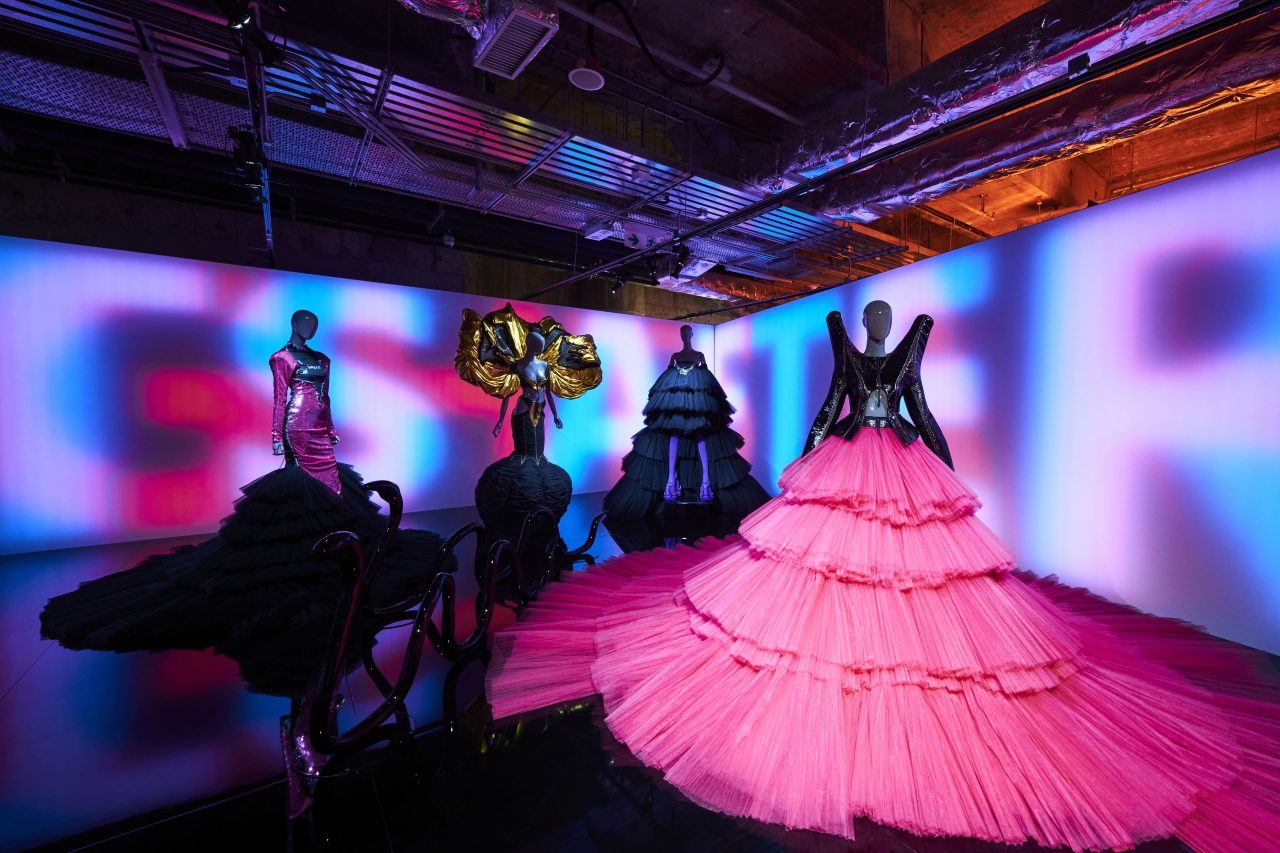
Works by Sensen Lii in the exhibition “The Love of Couture: Artisanship In Fashion Beyond Time”
Photo: K11 Museum
Works by Sensen Lii in the exhibition “The Love of Couture: Artisanship In Fashion Beyond Time”
Photo: K11 Museum
Sensen Lii isn’t afraid to bring drama to the table. For Couture Love, the Chinese designer condensed the wealth of fashion into three new pieces, each more dazzling and theatrical than the last.
“Historically speaking, couture is a very specific form of design. It has to be custom made for a specific person with a specific theme, concept and reason,” he said. “But contemporary fashion is more about the pursuit of feasibility and involves more creativity and imagination.”
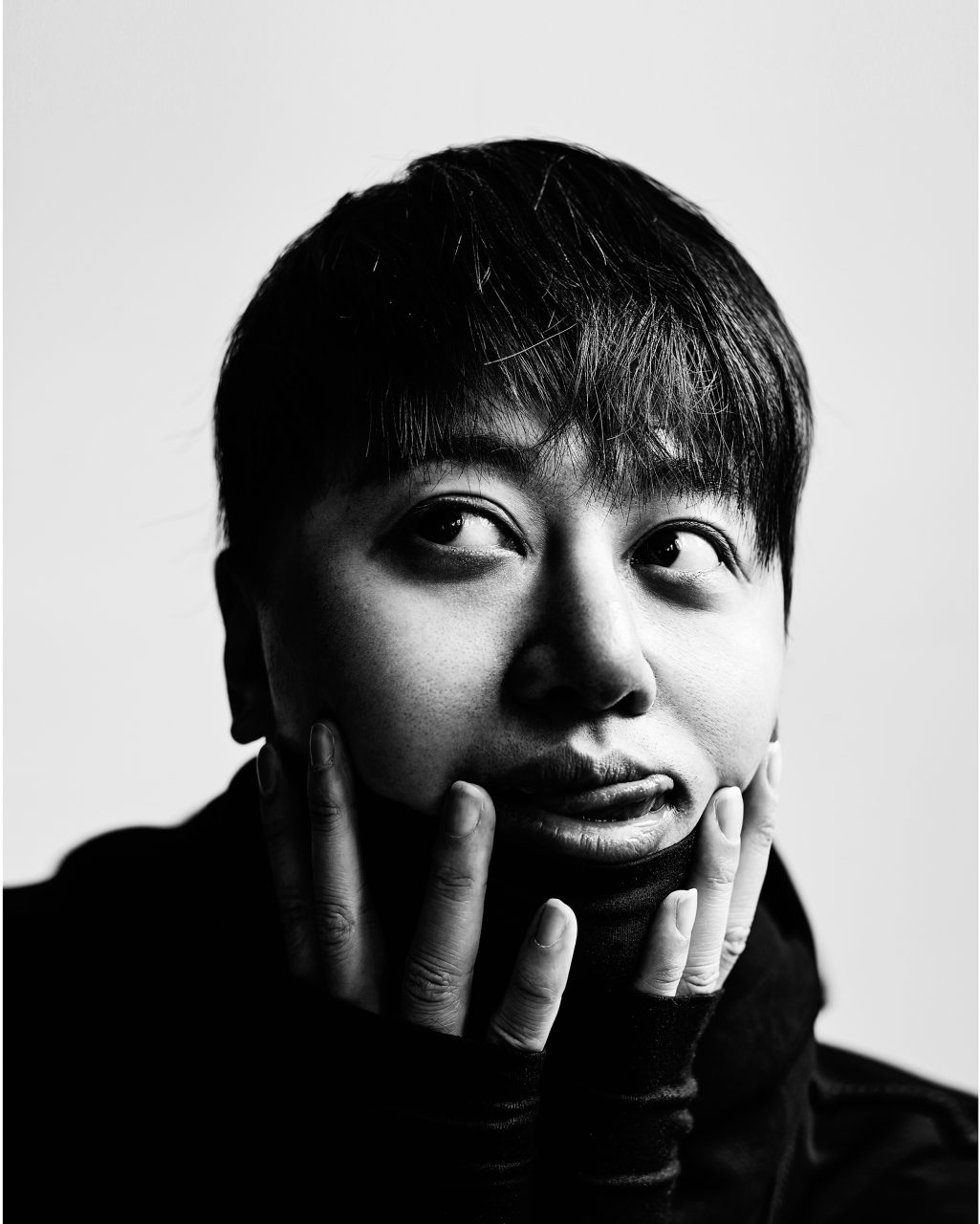
Chinese fashion designer Sensen Lii
Photo courtesy of K11 Musea
Chinese fashion designer Sensen Lii
Photo courtesy of K11 Musea
Imagination is at the core of his WINDOWSEN label. His brand name symbolizes a literal window connecting our reality to Lee’s universe, which centers around his vision of an inclusive, post-human world. “For me, clothing is a vehicle that gives voice to different minority communities.” he shared.
And so, Lii talks with his clothes. Marrying the grandeur of haute couture with the technicality of sportswear, he continues to create bold, genderless garments that fearlessly challenge the norms of our society.
[ad_2]
Source link


